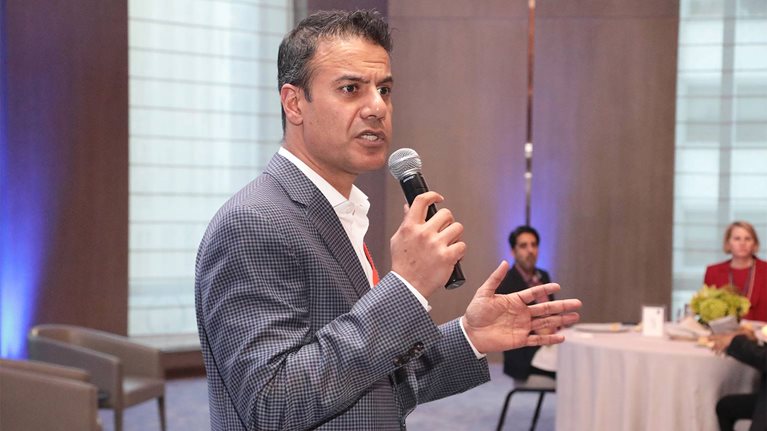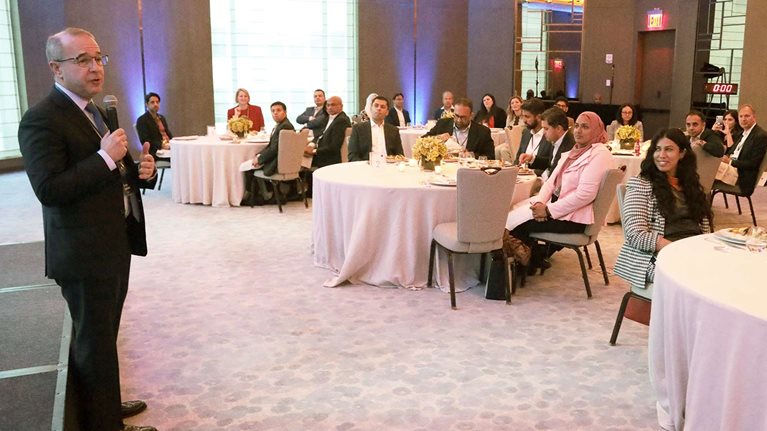Diversity matters. For more than a decade, our firm has been making the business case for it, and we have also been working to build diverse and inclusive spaces at McKinsey and beyond. In that spirit, Muslim colleagues hosted 50 executives for our second annual Eid al-Fitr event last month in New York.
The theme for this year’s forum was “empowerment.” The event included an afternoon of sessions on how Muslim Americans can work toward civic, social, and political inclusion, and help support and advance Muslim executives. The evening program included a dinner, a keynote address from McKinsey global managing partner Kevin Sneader, and an executive panel featuring Harvard University professor Marshall Ganz, The Markup general counsel Nabiha Syed, and former Informatica chairman and CEO Sohaib Abbasi.

“In Islam, leadership is a trust (amanah),” says Naufal Khan, a senior partner and organizer of the event. “This is core to our McKinsey values where we see ourselves as servant leaders partnering with our clients and colleagues who put their faith in us every day.”
In his opening remarks, Naufal laid out some of the challenges the Muslim community faces in the professional world. According to a Pew Research Center study, 75 percent of Muslims believe there is discrimination against them in the United States, and a Carnegie Mellon University study found that Muslim job candidates had a 13 percent lower callback rate compared with other job candidates during the hiring process. Several attendees offered personal anecdotes from their own experiences.
Organizing as a constituency – and having a shared purpose – is what’s critical towards seeing real change.
Marshall Ganz, professor at Harvard University
“We’ve come a long way towards greater inclusion and advancement of minorities in corporate America,” said Umran Beba, senior vice president and chief diversity and engagement officer at PepsiCo. “But when it comes to religion, that’s still something many feel should be left at the door.”
One attendee explained that embracing her identity as a Muslim has been a critical aspect of her success. “Having the conviction and confidence to be true to who you are has far-reaching implications for one’s success and ability to lead,” she said. “It’s important to figure out your leadership style. People will respect you more for it.”
That comment resonated with the entire room. As people have risen through the ranks in their respective companies, many talked about how important it was for them to feel a greater sense of ease in fully expressing themselves as Muslims among colleagues at work.

“When I knew I had the full support of the CEO, I don’t think he realized he had inadvertently given me the confidence to express myself as a Muslim,” said an attendee. “The onus is on us as leaders to be open about who we are as we progress within our organizations. This sends a powerful message to more junior colleagues who are looking to us to lead by example.”
Leading, though, is just one part of fostering greater inclusivity. “Organizing as a constituency – and having a shared purpose – is what’s critical towards seeing real change,” argued Professor Ganz, who has spent much of his life and career devoted to union, political, and community organizing for human, civil, and workers’ rights.
Professor Ganz, the son of a rabbi and a teacher, stressed this point by quoting Hillel: “If I am not for myself, who will be for me? When I am for myself alone, what am I? And if not now, when?” He called on everyone in the room to make their voices heard, whether that be with politicians, boards, or fundraising within their communities. “If you don’t author your own story of self, others will author it for you, and it may not be what you want to hear.”
In one of the event’s most inspiring moments, Carbonite CEO Mohamad Ali described how he had done just that when he stood with Massachusetts Attorney General Maura Healey in January 2017 as she announced a lawsuit that challenged the travel ban on seven Muslim-majority countries. Rather than be silent, he chose to use his identity as a Muslim to speak out.
“If we work together, there’s tremendous power to create change,” says Naufal. “We have an entire future generation that’s depending on us to do so.”